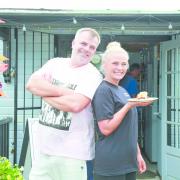Denise Welch, in lockdown in her Wilmslow home, talks about her new book and how she hopes it will support others feeling the isolation of depression.

Denise Welch has never been afraid to open up about her struggle with clinical depression but in her new book, The Unwelcome Visitor, she digs deeper than ever into her psychological past.
The past three decades have not been an easy ride for the actor, writer and Loose Women panellist, but her new title comes out at a time when the impact of the coronavirus pandemic is having a brutal effect on people with mental health problems. Denise hopes her own experiences will bring comfort to fellow sufferers.
Ever since she found fame in the late 1990s as Natalie Horrocks in Coronation Street, Denise has been bravely talking about clinical depression, an illness she developed after giving birth to elder son Matthew 31 years ago.
She says she was fortunate in that she had the support of her family including her first husband, actor Tim Healy, but even so, found there was little out there to help and that’s why she started talking about her experiences.
“I would have given anything to see somebody on television talking about this illness,” she admits.
“I’d had crippling postnatal depression, losing two and a half stone in three weeks. I couldn’t eat or drink; I was a complete catatonic zombie at the end of the sofa. I remember, there was an association for postnatal illness you could write to, but I couldn’t even pick up a pen and my GP at the time, a woman of about my age now, said to me: ‘well I had five children dear and I just didn’t have time to get depressed’. I’ve remembered that ever since.”
Talking down the line from the Wilmslow home she shares with artist husband Lincoln Townley, Denise explains the form of depression she suffers from actually has nothing to do with external circumstances, which is why she’s currently in a good place, mentally.
“It’s endogenous; it’s not about the situation I’m in, so I’m lucky at the moment because I don’t have my illness. I know that if I did, then life would be pretty horrendous.”
Denise admits she has shed a few tears watching the news and hearing stories about friends whose husbands have been sick with Covid-19, but she also considers herself fortunate because she and Lincoln, her husband of seven years, are suited to lockdown life.
“We have very busy lives but we also really love being together and not doing a lot in our downtime,” says the 62-year-old.
“Lincoln is an artist and he’s setting up an online art project and I’m quite enjoying being a little bit more domesticated. I’m doing more as regards cooking and things, although I’m not bored enough to start cleaning out cupboards just yet!”
“There are lots of people going, ‘oh you can use this time and learn a language and write a novel’ and it’s like: ‘you know something, if I want to lie in bed until one o’ clock in the afternoon watching rubbish reality television and then cook a bit of food and go lie on the settee and watch something else that’s what I’m going to do’. This is not the time to feel guilty about being a complete slob.”
Denise’s 48-year-old husband hasn’t found isolation too much of a stretch either, as he’s not a fan of the theatrical life he found himself part of when he got together with Denise.
“He’s always said, ‘oh my God, why do you always have to hug everybody?’ So he’s just hoping hugging is made illegal when this is over,” she laughs. “He loves it when you’re walking along the road and people get out of your way and he’s, ‘this is brilliant, this is.’”
Her sons: 31-year-old Matthew, lead singer of Brit Award winners The 1975, and 18-year-old Emmerdale actor Louis are away from home and she’s relieved. “Matthew’s with his girlfriend and Louis is staying with one of his pals and I’m thrilled about that because I don’t think grown-up families being together is good for more than a weekend,” she explains.
“People say: ‘Ooh I bet you wish you had your family with you’ and I say ‘not really.’ I think it’s much healthier for us all that we’re apart but can talk every other day on the phone.”
Humour aside, she reflects on those of her friends who are on their own and really struggling.
“It’s a very, very unprecedented and strange time. I’ve stopped trying to read every single news item and every conspiracy theory in the middle of the night, which is hard because you read one article and that takes you to another one and then you think there’s some truth in that... by which time you’re in another twilight zone. But there’s sweet bugger all that any of us can do about it. We just have to trust the people in charge and trust the science.”
The Unwelcome Visitor, which is published this month, came about after Denise recorded herself experiencing a bout of depressive illness to try to give people an insight into clinical depression.
“I recorded this episode over three days, and I was absolutely blindsided by the overwhelming response,” she reveals.
“It didn’t register to me as someone who has spoken openly about this for 30 years that it would have such an overwhelming response – like a million and a half people seeing it – which goes to show that people need to feel that they’re not the only one. Then three publishers approached my literary agent about doing a book and I didn’t immediately say yes because it meant revisiting moments of my past I didn’t really want to live through again, but I did and I’m very proud of it.”
She says it’s not a self-help book, although she hopes people suffering depression and their loved ones will be consoled by it.
“The book is called The Unwelcome Visitor – Depression and How I Survive It; it’s not called How to Survive It, because I don’t have any medical qualifications,” she explains.
“I can only say how I do it. If people take comfort from that, that’s what the book is about. I know people do take comfort from it because of how they react every time I talk about it.
“This illness is unlike any other in that it’s so isolating. With an illness such as cancer, people know how bad and how awful it is for the sufferer, but with the depressive there’s still the attitude of ‘well, what have you got to be depressed about? Why don’t you just get up and go to the Trafford Centre and buy yourself a new dress. Think about the people in Africa starving Denise, then you won’t be depressed...’ You’d never say that to a person with cancer. You just wouldn’t say those things to anybody with a physical illness.
“Do you know that 99 per cent of people who are off work with a mental illness don’t get a get well card? That’s the difference. It is getting better. We are talking about it more and I feel I have played a small part in that.
The Unwelcome Visitor – Depression and How I Survive It, by Denise Welch, is published by Hodder & Stoughton on June 25th



























